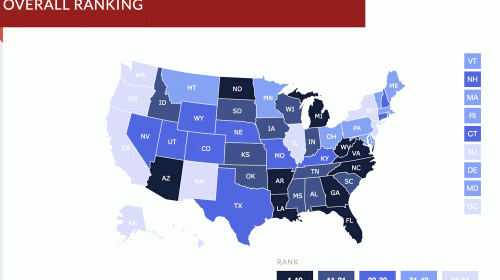Sources: Associated Builders & Contractors, Washington, D.C.; CP staff
The Sunshine State tops the ABC 2018 Merit Shop Scorecard, vaulting from ninth last year on the strength of free enterprise principles, open-competition approach to the construction sector, increased career and technical education opportunities, and job growth rates. Michigan saw the biggest year-over-year improvement in its ranking, rising from 24th to seventh after the repeal of its prevailing wage law, which will foster greater competition and lower construction project costs.
ABC bases the annual ranking of states and District of Columbia on policies or programs that encourage free enterprise, open competition, workforce development, and the awarding of construction contracts solely on merit—regardless of labor affiliation. “States like Florida and Michigan have built an environment that allows merit shop construction contractors to thrive,” says ABC Vice President of Regulatory, Labor and State Affairs Ben Brubeck. “Prioritizing policies that support small business owners, the American worker and overall construction sector spurs economic growth, which directly leads to more projects and therefore more construction jobs across the country.”
In contrast to Florida and Michigan, California tumbled from 38th in 2017 to 50th on the 2018 Merit Shop Scorecard due to a decreased focus on workforce development and careers in technical education. The Golden State was trailed only by Illinois, which was ranked last for the second year in a row with an F rating in project labor agreements, prevailing wage, Right to Work and workforce development incentives.
“With an estimated 500,000 open construction positions in the United States, it is essential that states prioritize workforce policies that recruit, educate and benefit the American worker and fill the skills gap,” Brubeck affirms. — www.meritshopscorecard.org
